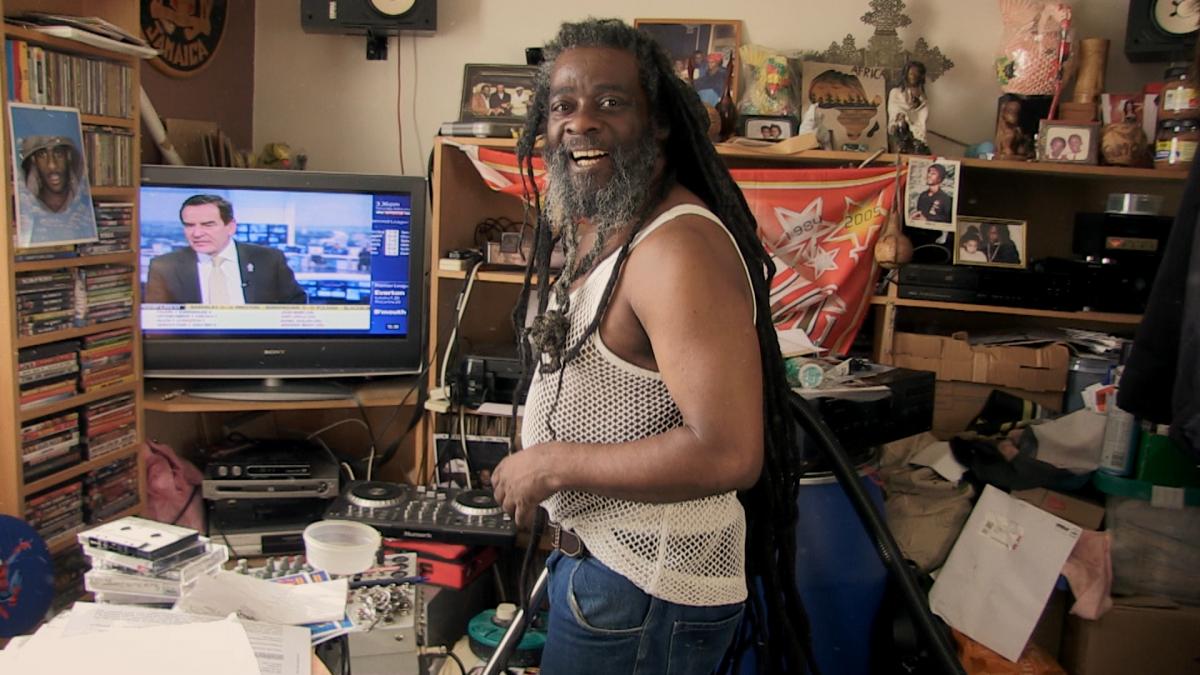
Living in Limbo
Reggae is rich with questions of belonging, but instead of domesticity it focuses on the state of limbo. After watching the documentary Being Blacker, Derek Walmsley examines how the Brixton figurehead Blacker Dread struggles with what he once called home.
The representation of home in reggae has always been complex, which is one reason the music remains so rich with movement, dreams and allusions. In the early 70s in the UK, reggae dances were the equivalent for new immigrants of church – places where people divided and ruled by whites could celebrate and dream together as a community. Reggae can be romanticised as a guiding light that keeps someone on the right path, but in Molly Dineen's 2018 documentary Being Blacker on producer and Brixton community figurehead Blacker Dread, music is far away. Instead, Blacker’s house is filled with many connections, possibilities and memories, many of which are unfulfilled. Blacker came to the UK as a young child, but now yearns to return to the Jamaica he remembers.
This might symbolise for him, like in reggae, not home but specifically homeland. The cornerstone of roots music, The Abyssinians' early 70s track «Satta Massa Ganna», begins with the line «There is a land far, far away...», a place where «there is no night, there's only day». This theme, repeated often in roots, proposes somewhere else that one should be, distant in both time and space. Reggae is rich with such imaginary and remagined places: Augustus Pablo's melodica sketched a blissful space of plenty East Of The River Nile, Burning Spear dreamed of idyllic living out of the city with Man In The Hills. Musicians and producers invoke time and again the «Train To Zion» (Linval Thompson, U-Brown, Bingy Bunny and many others) or the «Roots Train» (Junior Murvin). In contrast there is not much domesticity in roots music, outside of the romantic sphere of Gregory Isaacs, the lonely lover whose yearning entreaties helped pave the way for lovers rock with song titles like «Coming Home», «Love Light (Burning)» and «Intimate Lovers».
Living in a Placeholder
Roots music can allude to deep questions of belonging, origins and destination, but to do so, it uses placeholders to address the present state of limbo. The idea of the ghetto is right at the heart of reggae, and returned to time and again, from different directions and with different expectations, from Big Joe's «Sufferation In The Ghetto» to U-Roy's Peace And Love In The Ghetto». The ghetto is a place of pride, invention, solidarity, hardship, hustling, struggle, pressure. The ghetto contains everything in life, yet is a place you seek to move out of, so whatever is said always feels provisional. The idea of babylon in reggae, another placeholder for the current state of affairs, is powerful because it invokes both the ancient and the modern. Babylon is the biblical place people wished to move out of, and in the present day, it's used as a catch-all category for any of the many manifestations of oppression and power structures. Simple instances of everyday hardship are put in a proper context of recurring patterns. So, for instance, Gregory Isaacs in his classic «Babylon Too Tough» address police brutality and corruption, identifying not merely violence but criminality and animal instincts: «Dem a walk dem a loot dem a shoot... Babylon are a brute».
In reggae, the possibility of home can never be taken for granted, due to racism, the inequities of modern society, and the displacement and diasporic connections that are the legacy of colonialism and slavery. Dineen's film reaches a melancholy conclusion as Blacker plans to go and live back in Jamaica, somewhere he can expect to see someone with the same skin colour as him in power, and not to be judged on the same basis. The roots of roots reggae extends across countries, oceans and generations. And it has to because, as Dineen's film explores, everyone needs a home they can call their own.
Biography
Published on December 25, 2018
Last updated on April 10, 2024
Topics
A form of attachement beyond categories like home or nation but to people, feelings, or sounds across the globe.
From Bangladeshi electronica to global «black midi» micro scenes.
What happens, when artists move from one to another country? For example, when an Arab artist replaces the big tractors in her the village with big jeeps of the West.
Snap
